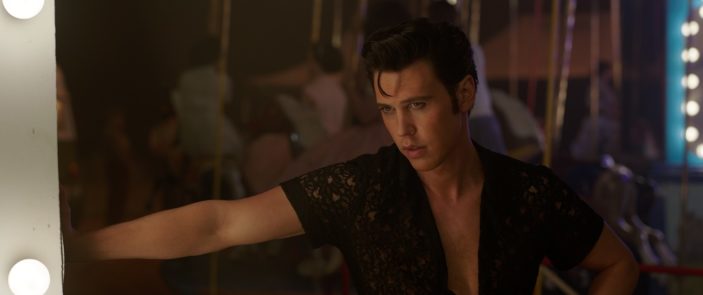
If Baz Luhrmann is a director whose gaudy, lavish, larger-than-life style has been an aesthetic you haven’t gelled with thus far, his “biopic” Elvis isn’t about to change your mind.
The director of Moulin Rouge suitably shakes, rattles, rolls, razzles and dazzles over a sometimes-exhausting 159 minutes, kinetically pacing the king of rock ‘n’ roll’s life, with a particular focus on his relationship with his questionable manager, Colonel Tom Parker (a strangely accented Tom Hanks, having a ball but failing to deliver his finest work).
Hanks may be the name here, but it’s Austin Butler who’s the ultimate draw. Embodying Presley with every fibre of his being, this is the very definition of a star-making turn; for the actor his career will undoubtedly be referenced in only “before Elvis” and “after Elvis” terms.
Elvis fans are more likely to wish that Luhrmann’s film was painted with a few wider brush strokes regarding certain aspects of his life and career – same can be applied to his wife (Olivia DeJonge doing fine work nonetheless as the underused Priscilla) – and though the inclusion of Parker and how he was able to manipulate Elvis so shrewdly is important, there’s evidently so much more to him as a whole that it’s a shame his movie career, bouts of depression, and eventual spiral that caused his infamous weight gain are so overlooked; that being said, real-life footage of Presley in his final days that’s played opposite a recreation from Butler is so impressively striking that you can’t help but wonder how a grittier, more straightforward telling would have played out.
There’s no use really hoping for all the things we didn’t get, because what we do get – when executed correctly – is pretty bloody electrifying. The film is at its best when it lets Butler loose, thrusting, smirking and crooning his way through stunning performance pieces that speaks to the unmatched charisma of Presley and Butler’s respectful manifestation.
As to be expected, Elvis as a film is visually glorious – Mandy Walker‘s cinematography and Catherine Martin‘s costume and production design are a sumptuous treat – and Luhrmann’s unique soundtrack choices keep it from ever succumbing to audible expectation; as much as this is an Elvis-heavy film, the incorporation of modern hip-hop and pop sounds (Doja Cat raps over a “Hound Dog” sample, whilst Britney Spears‘ signature pop opus “Toxic” is utilised to underscore a rendition of “Viva Las Vegas”) speak to the director’s flourishes.
Though it may play fast and loose with Elvis’s life, and the first 30-or-so minutes of the film truly need to learn that less is indeed more when it comes to editing and exposition, it can’t be denied that Butler’s performance is nothing short of revelatory. He consistently keeps the film from buckling under its own ambitious vision, resulting in a film that could’ve been caught in a trap (yes, Elvis song reference intended) had it not had such a glorious frontman steering away from an overly zealous mentality.
![]()
![]()
![]()
![]()
![]()
THREE STARS (OUT OF FIVE)
Elvis is screening in Australian theatres from June 23rd, 2022.
